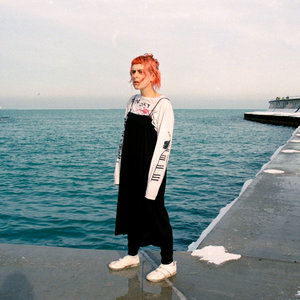Lala Lala: The Lamb (Hardly Art)
London-born Lillie West isn’t interested in the myth of victorious finality
Released Oct 17th, 2018 via Hardly Art / By Emilie Kneifel
 Lillie West named The Lamb for her sober self, wet and shivering. Not from a seasonal thaw, but a cataclysmic one. A colossal tectonic shift. Her shaky-strong voice blusters above grounding guitars like the first spring wind, like maybe all of this could actually melt. But West isn’t interested in the myth of victorious finality; she still sometimes wonders “I did the right thing, and for what?” But there’s no doubting her clenched-teeth intention to do that right thing anyway. She insists, “You think I'm good, well I want to be gooder,” ditching even grammar’s artifice.
Lillie West named The Lamb for her sober self, wet and shivering. Not from a seasonal thaw, but a cataclysmic one. A colossal tectonic shift. Her shaky-strong voice blusters above grounding guitars like the first spring wind, like maybe all of this could actually melt. But West isn’t interested in the myth of victorious finality; she still sometimes wonders “I did the right thing, and for what?” But there’s no doubting her clenched-teeth intention to do that right thing anyway. She insists, “You think I'm good, well I want to be gooder,” ditching even grammar’s artifice.West knows some things can’t be shed, and she doesn’t trust what she’s had to keep. Wary of her slightest gesture, she begs, “If I’m using my hands, can you cut them off?” She’s so sure she knows her own destructiveness — “If I could drive my car/ then I would trash it.” — when it’s shame curdling her memories and telling her ugliest autobiographies. It traces her tendencies back to childhood, deems her stubbornness “too late to change/ it’s forever true.” But there is one skin to hopefully shirk: “Now that I am older, I have a different name.” She bids the old ones adieu (“Goodbye Lucky,” “Goodbye Fakey”) “maybe forever.”
This inner thrash has rendered fickle truth itself. Writing something down means “it loses its meaning;” her “fantasy is fire is a mark I missed/ is a piece of metal on a tongue/ is god is nothing.” Her words bubble up and defy any gravity. In so surreally wavering, they elucidate reality’s truth: that it never sits still. Which, of course, becomes domestic in its very novelty. “Maybe one day I'll be surprised/ with my twin fists with my twin eyes.”
It’s unclear who Lala Lala is singing to at times — “stop messing me up please stop melting” — whether it’s herself, someone else, or old toxicity that seeps. But her shriek that “you are the reason my heart broke behind my back” isn’t accusatory anyway; it’s revelatory. It’s breaking into truth, cold and clean. On the final track she sings to someone, “I release you from us both,” then fades out, repeating her lala lalas, calling the name she’s given herself. 9/10





 All Content RSS Feed
All Content RSS Feed
Follow Bearded on...